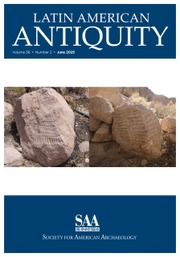Article contents
A Middle Archaic Archaeological Site on the West Coast of Mexico
Published online by Cambridge University Press: 20 January 2017
Abstract
The Cerro de las Conchas shell mound, located on Mexico's south Pacific coast, was formed between 7,500 and 6,000/5,500 years ago, during the Middle Archaic period. Few Mesoamerican coastal sites are as early or have been studied so intensively. Limited diversity in the artifact assemblage and faunal origins, the presence of bedded strata, and the absence of features associated with permanent residency indicate that the site was used intermittently as a processing station for aquatic foods. Seasonality studies on clam shells suggest that this occurred year round. The site likely was situated initially adjacent to a brackish water lagoon near a tropical rainforest because faunal studies indicate a strong focus on lagoonal taxa, whereas a forested environment is indicated by phytoliths. Toward the end of the Middle Archaic, however, an increase in faunal and artifact richness, an emphasis on fauna with a tolerance for marine conditions, and phytolith evidence for more disturbance vegetation compared to earlier times, may be due to marine transgression. Later, pottery-using agricultural peoples used the site for farming and possibly residency. This example of early human adaptation to a coastal environment of Mesoamerica permits a corrective to previous research that is weighted heavily in favor of upland settings.
En este estudio se presentan los resultados de investigaciones arqueologicas recientes en el sitio de Cerro de las Conchas, un conchero que se ubica en la costa del Pacífico, en Chiapas, México. Se centra en la ocupación del Periodo Arcaico Medio (7500-6000/5500 a. P.), cuando dos estratos de conchas se formaron en el núcleo del conchero. El estrato más bajo contiene conchas y huesos de fauna propios de las lagunas costeras, y en el mismo estrato la mayoría de los fitolitos son de árboles selváticos. Con estas bases, inferimos que al principio el sitio se formó cerca de una laguna en la parte interior de un sistema laguna-estuario, y no muy lejos de una selva tropical. Los pocos tipos de artefactos, las evidencias estratigráficas de capas quemadas y no quemadas, y la ausencia de elementos materiales que indiquen un modo de vida sendentario, nos permiten interpretar que el sitio corresponde a un campamento donde se procesaban recursos lacustres exclusivamente. El estudio de isótopos de oxígeno en las conchas de almejas, indica que el sitio fue usado esporádicamente a lo largo del año. En cambio, el estrato superior que también data del Arcaico Medio, contiene una diversidad más amplia de artefactos, moluscos y vertebrados, con especies tolerantes a hábitats marinos. Al mismo tiempo, los fitolitos indican que había una menor presencia de plantas selváticas en comparación con del la selva y más vegetación secundaria. Posiblemente estos cambios se asocian con modificaciones de la transgresíon marina. En épocas más recientes, los grupos agrícolos con cerámicos usaron el sitio para cultivo y posiblemente como zona habitacional, por lo que se depositó una capa de suelo negra encima del conchero. Este ejemplo de adaptación humana en un ambiente costero en Mesoamérica durante el Arcaico Medio, permite balancear el énfasis que se ha dado en investigaciones previas enfocadas a las tierras altas.
- Type
- Reports
- Information
- Copyright
- Copyright © Society for American Archaeology 2002
References
References Cited
- 32
- Cited by


